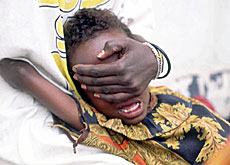
Unicef urges action to combat genital mutilation

More needs to be done to stamp out female genital cutting, according to the Swiss branch of the United Nations Children’s Fund (Unicef).
The charity is warning that anyone found guilty of carrying out the procedure in Switzerland could face up to ten years in prison.
Unicef estimates that as many as 130 million women in Africa have been subjected to genital mutilation – the practice of cutting away part or all of the external female genitalia.
The practice is traditional in some African and Asian societies and can cause long-term suffering to the girls affected. Victims report pain and complications in sexual intercourse, menstruation and urinating, which can persist for the rest of their lives.
According to latest available statistics, around 20 per cent of gynaecologists in Switzerland have seen women who have undergone genital cutting as children.
In the majority of cases the patients concerned were immigrants from Somalia, Ethiopia and West African countries.
Unicef cannot say whether cases of genital mutilation are more or less prevalent in Switzerland than in other European countries.
“What we know is that in countries with large migrant populations the prevalence will be higher than elsewhere,” said Unicef Switzerland’s head of information, Alexander Rödiger.
Prosecution possible
This week the Zurich-based charity published details of a new report aimed at clarifying uncertainty about whether the Swiss legal system includes provision to prosecute individuals who perform acts of genital mutilation.
“We wanted to know whether Swiss law protects children who are in danger of being mutilated… and we found that if a doctor wants to practise genital mutilation he or she can expect to end up behind bars,” Rödiger told swissinfo.
Unicef cites reported cases of doctors illegally entering the country to perform female genital cutting in Switzerland.
But the charity points out that it is not just medical professionals who could find themselves on the wrong side of the law.
“Often parents do not know that they can be punished for agreeing to allow the genital mutilation of their children,” said Rödiger.
“Our study found that they can be prosecuted under Swiss law if they take their daughters outside the country for genital mutilation,” he added.
Unicef is calling on the Swiss authorities to ensure that all migrants who arrive in Switzerland are informed that “mutilation of this kind has consequences”.
“One conclusion of our report is that much more needs to be done to raise awareness among parents from countries like Somalia and Burkina Faso that such acts of mutilation are forbidden,” said Rödiger.
Patient confidentiality
Regula Schlauri, a lawyer from canton Zug and co-author of Unicef’s report, says one obstacle to successful prosecutions in Switzerland is that gynaecologists who discover evidence of mutilation do not have to report their findings to the police.
“The rules are different in every canton, but in general patient confidentiality means that doctors are not legally obliged to pass on information about suspected cases of genital mutilation,” said Schlauri.
While the authorities in France have prosecuted several cases of female genital cutting, no similar action has been taken in Switzerland.
One case against a father who stands accused of forcing his two daughters to undergo an operation to cut away part of their genitalia is currently pending in canton Geneva.
“It’s a question of a lack of knowledge,” said Rödiger. “People often don’t know that mutilation exists… so I think that if we can raise awareness of the issue then we will see cases [being prosecuted] in future.”
swissinfo, Ramsey Zarifeh
Unicef estimates that some two million girls are at risk of some form of genital mutilation every year.
The charity says that as many as 130 million women in Africa and the Arab world have undergone the procedure, in which parts of the female genital organs are removed.
In many male-dominated societies, female genital mutilation is considered to be a cultural or religious requirement.
Female circumcision causes unbearable pain and various gynaecologial and obstetric problems for women.

In compliance with the JTI standards
More: SWI swissinfo.ch certified by the Journalism Trust Initiative




























You can find an overview of ongoing debates with our journalists here . Please join us!
If you want to start a conversation about a topic raised in this article or want to report factual errors, email us at english@swissinfo.ch.